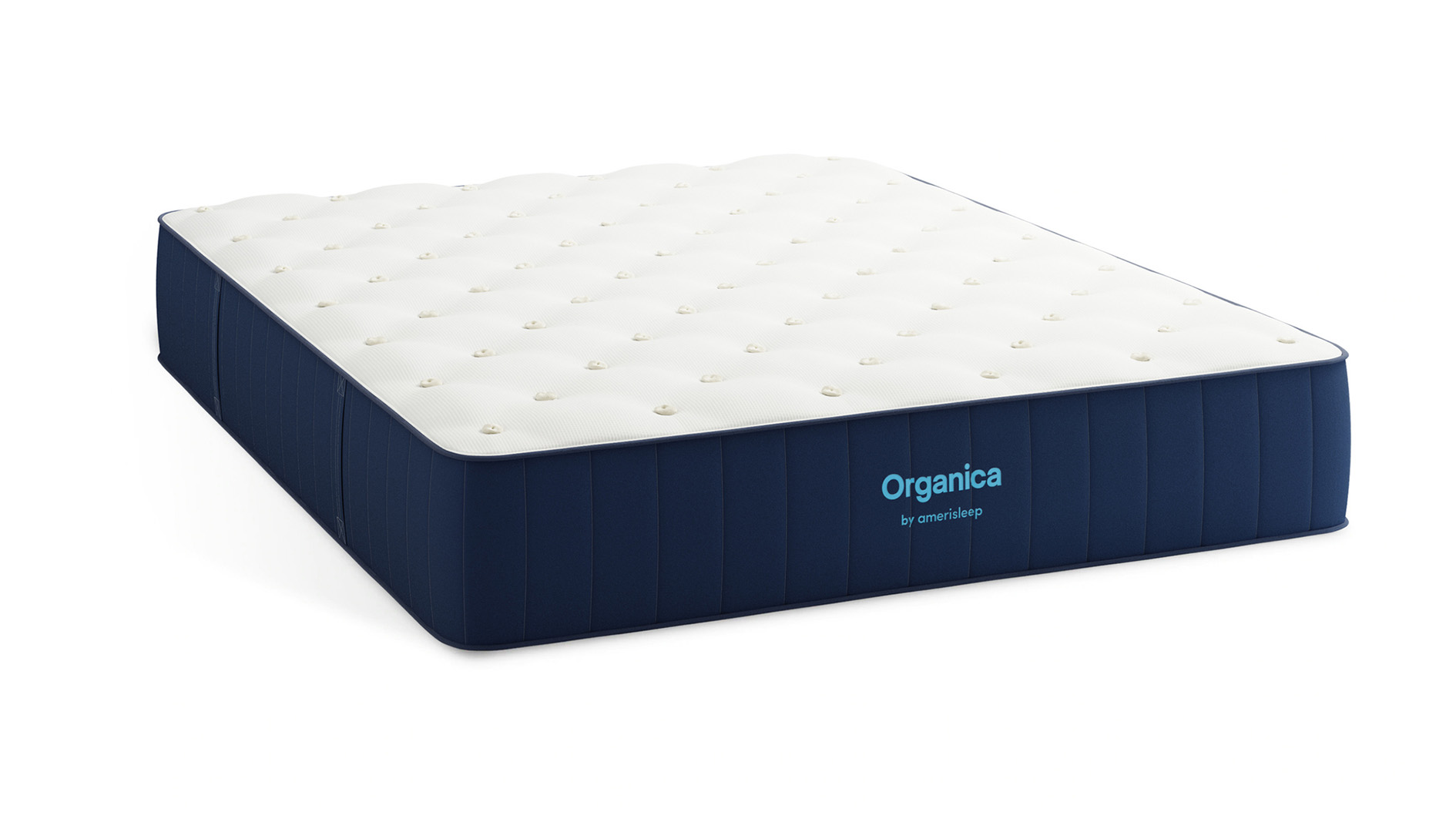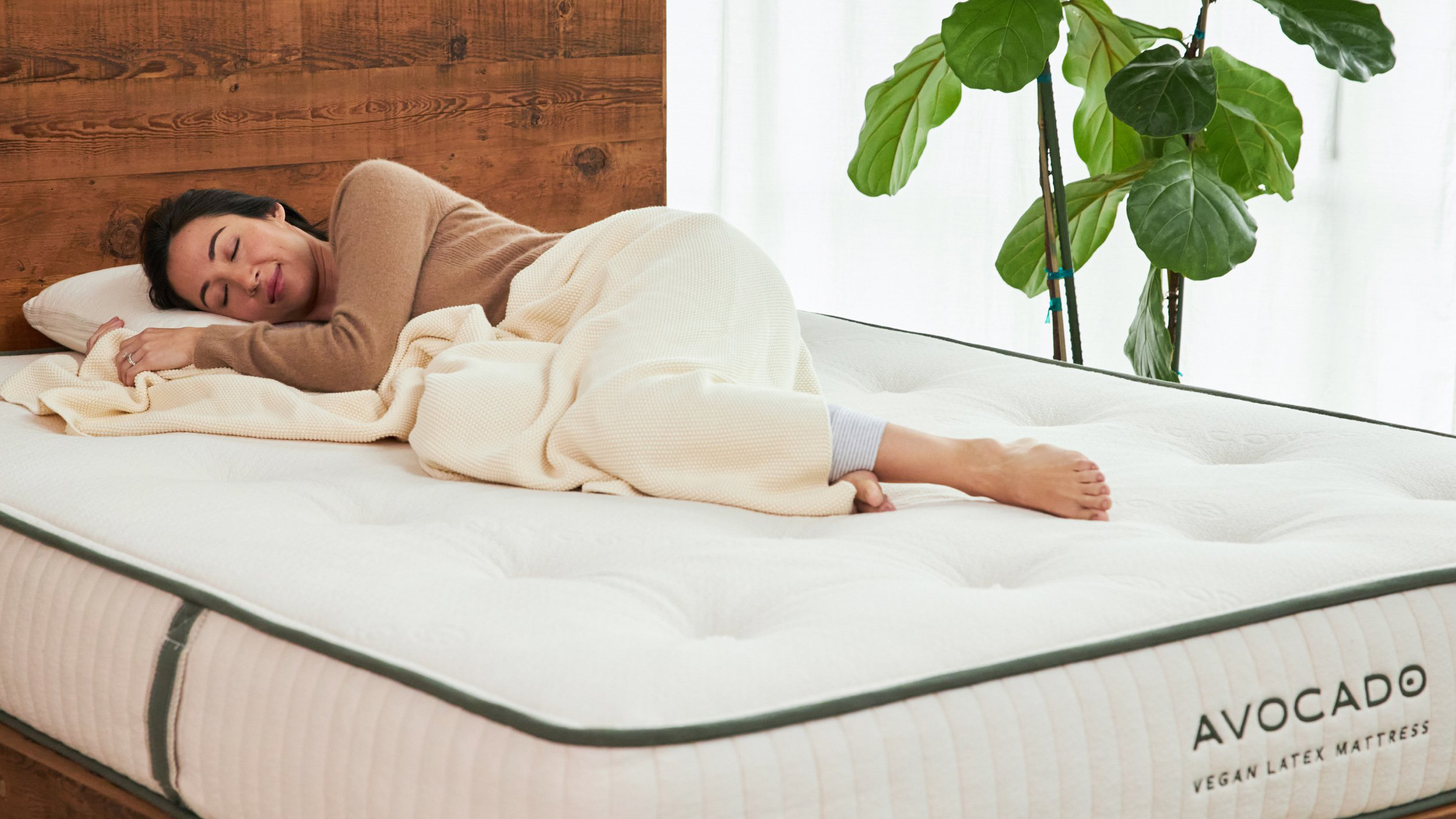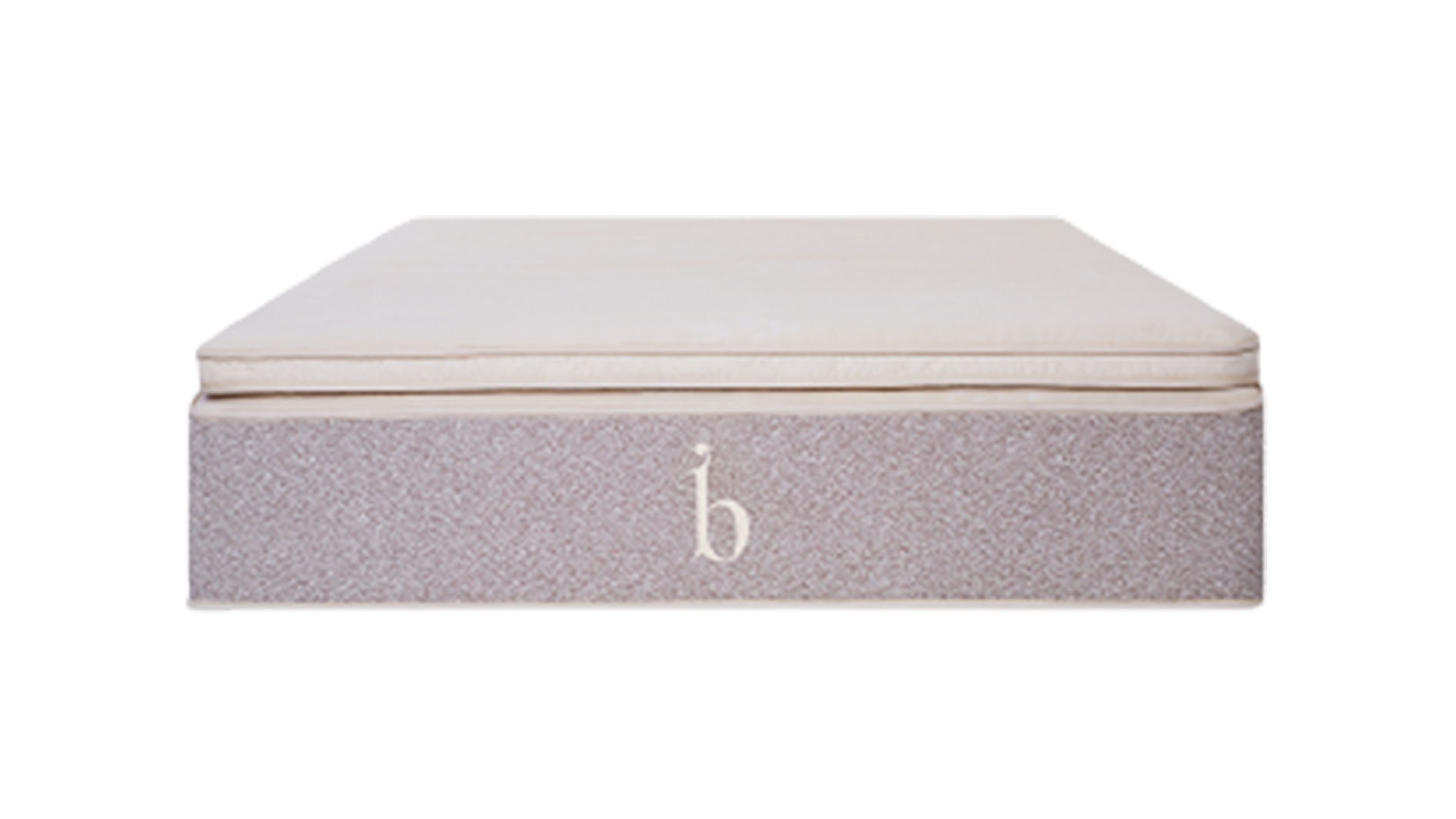Organic vs natural mattresses: Is there a difference?
In our organic vs natural mattress comparison, we break down their key differences to help you choose the right one for you

With organic vs natural mattresses, at first glance there doesn’t appear to be any difference between them. After all, surely these are interchangeable terms for the same type of bed? Yes and no. When it comes to picking the best mattress for sleep, we all want to feel assured that we’re sleeping on a healthy surface and not breathing in anything suspect. Thankfully, modern mattresses are rigorously tested and held to very high standards.
So when we’re talking about organic vs natural mattresses, what we’re really talking about is the materials used to make them. Both types are also known as non-toxic or eco-friendly mattresses as they use materials such as wool, cotton and latex, rather than anything synthetic. Proper organic mattresses are nearly always the more expensive of the two because they are stuffed with GOTS and GOLS certified materials. Today's best organic mattresses start from around $1,099 for a queen size.
To confuse matters further, you’ll come across plenty of non-toxic mattresses that aren’t made from natural or organic materials – instead they’ll use something like CertiPUR foam (as found in many of the best memory foam mattresses), which is safe to sleep on – and more of these beds are going carbon neutral too.
In our organic vs natural mattress comparison, we get under the hood of the different materials, certifications, benefits and drawbacks to help you figure out which type is right for you.
Organic vs natural mattress: What is an organic bed?
- Organic mattresses are made with certified organic materials
- They are also more expensive than natural beds
- They contain no harmful toxins or chemicals
A true organic mattress is made using non-toxic, fully certified (GOLS, GOTS, etc) organic materials such as wool, cotton and natural latex. These are completely natural fabrics that contain zero chemicals.
But it’s also easy to fall foul of clever marketing, so you’ll find some mattresses labelled ‘made with organic materials’, but those could be 1% organic instead of 100%. Big difference, right?

The gold standard to look out for is mattresses labelled with the GOTS acronym, which stands for Global Organic Textile Standard. Not only does this certify that organic raw materials were used in the making of the bed, it also verifies that the finished product meets the GOTS organic standards. GOTS also allows for specific non-organic components, such as steel coils, food-grade polyethylene, or plant-based PLA to be used inside an organic mattress.
In addition, if the organic mattress you’re looking at contains latex, make sure this is GOLS (Global Organic Latex Standard) certified. This ensures you are buying a mattress with natural rather than synthetic latex. There’s a big difference in how long natural latex lasts compared to synthetic (degrades more easily). Our dunlop vs talalay latex explainer goes into this in more detail.
Why would you want to consider an organic mattress? For some sleepers, certain chemicals and synthetic materials used in standard mattresses can act as an irritant, especially if you have respiratory problems or a skin issue such as eczema. An organic mattress is a stronger guarantee of healthier sleep.
Organic vs natural mattress: What is a natural bed?
- They don’t always use fully certified organic materials
- They have lesser synthetic materials than standard mattresses
- They now come in bed-in-a-box varieties for convenience
Natural mattresses differ from organic models as they may still contain some synthetic materials. Although a natural mattress may contain some chemicals, there should be far less of them. Natural beds are generally cheaper than a true organic mattress too, as they don’t use as many expensive, fully certified organic materials.
Most natural mattresses make use of products such as bamboo fiber, silk, cashmere, cotton and wool. These fillings are natural and not man-made, as well as being extremely comfortable and environmentally friendly.
The biggest selling point for most people is the price – natural mattresses are often considerably cheaper than a true organic mattress, and thanks to clever packaging and shipping methods, they are even popping up among the best mattresses in a box as an affordable option for eco-friendly sleep.
Organic vs natural mattress: Key differences
- Proper organic beds use GOTS and GOLS certified materials
- Natural beds may use a mix of natural and synthetic materials
- Natural mattresses are usually always cheaper than organic ones
Broadly speaking, organic mattresses contain no synthetic materials, whereas natural mattresses contain less synthetic materials than other standard types. Here are some of the ways in which they differ:
Full certification – Only a fully organic mattress will have GOTS / GOLS certification for every component contained within the mattress. You will find, however, that natural mattresses will contain some components that have these certifications.
Toxicity – Many natural mattresses still use foam, which is prone to something known as ‘off-gassing’ (read our what is mattress off-gassing feature for more). This means that, once the bed is unboxed, the mattress will release gases and chemicals into the air for a few hours or days.
This can also be accompanied by a strong, new mattress smell. However most natural mattresses will be low VOC (volatile organic compound), meaning that the chemicals have a much lower and less harmful toxicity.
Bounce – As nearly all true organic beds are made with some element of natural latex, sleepers will find that they have a high natural ‘bounce’. This makes them ideal for combination sleepers who move about a lot during the night, as the latex encourages manoeuvrability.
Allergies – While many natural mattresses use hypoallergenic materials, they will still contain some chemicals. For those suffering with conditions such as eczema or respiratory problems, an organic model is the safest choice as there are no irritants within the materials.
Choice and budget – True organic beds aren’t a dime a dozen, so your choice is going to be more limited. Natural mattresses use a wider range of materials so you’ll have more of a choice on the construction and style that suits you. In general, natural models are cheaper.
Organic vs natural mattress: Prices
- Organic beds have higher price tags
- Natural mattresses have shorter lifespans and smaller price tags
- Most months you'll find money-off deals on both types
Organic and natural mattresses are more costly than more standard mattress in a box offerings but, as we’ve discussed, there are plenty of reasons to invest in one. Mattress sales happen all year round, but the best times to shop are during big shopping events like the Black Friday mattress deals or national holidays.
Our favorite brand is Birch, which is a natural mattress from the parent brand that also makes Helix and Brooklyn Bedding beds. In our Birch Natural mattress review, we found this mattress was a great choice for combination sleepers, with a buoyant yet comfortable feel.

Avocado is perhaps the best-known brand in this area. Its products are high quality but expensive, so it's worth keeping an eye out for an Avocado sale or deal to take the price down (there's often 10% off around national holidays). In our Avocado Green mattress review, which focuses on the flagship model, we found it offered a firmly supportive sleep surface that's ideal for back sleepers or heavier bodies, but might lack cushioning for side sleepers or lighter weight individuals.
If you're on a tighter budget, our top affordable pick comes from Awara. In our Awara Natural Hybrid review we found it offered excellent support and pressure relief in all positions, although it didn't isolate movements very well. It's usually around $1,099 for a queen size using an Awara promo code, which is about the least you'll pay for a decent natural mattress.
If you have decided to take the plunge but aren’t sure what suits your body and sleeping style, our feature on how to choose a mattress will give you some helpful hints. And if you are spending a higher amount on your mattress, make sure you choose one that comes with a decent warranty.
Organic vs natural mattress toppers
- Natural mattress toppers use natural and synthetic materials
- Organic bed toppers are quite often cooling too
- Both are harder to care for than standard toppers
Much like the mattresses themselves, many of the best mattress toppers are now made from a range of either natural and synthetic materials, or fully certified organic materials.
Avocado Green is one of the go-to brands for organic bed toppers, with its Organic Latex Mattress Topper (priced from $349 at Avocado) attracting over 2,200 user reviews and a high user review score of 4.6 out of 5 stars.
This organic mattress topper has a 2" thick slab of natural latex plus a layer of organic wool and cotton, and it comes in two different feels (Plush and Firm) and a raft of sizes.

Birch by Helix is another big player in the world or organic and natural mattress toppers, and its Birch Plush Organic Mattress Topper is one of our top picks. It measures 3" deep and is a mix of natural latex, organic wool and organic cotton. The Birch offering is slightly cheaper, with a starting price of $300, but Avocado's has a 365-night trial period. Both have a 10-year warranty.
Organic and natural mattress toppers opt for materials that are naturally cooling, such as wool and latex, and naturally sweat-wicking, such as cotton. Latex is a good choice for making softer beds firmer, and is a popular material used to make the best cooling mattresses.
Organic vs natural mattress: Which should you buy?
When it comes to organic vs natural mattresses, both types have excellent options available and offer excellent support, full body comfort and pressure relief. Motion isolation is good and they often use naturally cooling materials including wool and latex, making them suitable for hot sleepers.
The main difference comes with the price tags, so if you’re on a tighter budget, a natural mattress is slightly cheaper than a fully organic model and will therefore be the right option for you. If you have no budget and want a fully certified bed, pick an organic model.
It’s also important to consider your sleeping position and any allergies when picking an organic or natural mattress. Many of them now come in different feels (soft, medium-firm or firm, for example), so you can normally find one to suit your sleeping position, body weight and postural needs.
In addition to that, we'd recommend looking for brands that offer a generous sleep trial so that you have a good amount of time to decide on whether the bed is suitable for you. Avocado Green offers 365 night trials, for example, which is the longest we've come across in this sector.
We’ve put together an expert guide to the best organic mattresses on the market, which will give you further advice on what is suitable for your needs. But when it comes to the decision between organic vs natural mattresses, you’ll find big comfort on both sides.
Read more:
- The best Saatva mattress discounts to shop
- How to choose the best pillow for sleeping
- Sleep calmly with the best weighted blankets
- Nectar mattress sales and deals for every budget
Sign up to get the BEST of Tom's Guide direct to your inbox.
Get instant access to breaking news, the hottest reviews, great deals and helpful tips.

Jo Plumridge is an experienced mattress reviewer with several years' experience covering all things mattresses and sleep, and who tests memory foam, hybrid and organic mattresses. What Jo doesn't know about a boxed mattress isn't worth knowing, so naturally we tasked her with producing a series of features for Tom's Guide looking at all aspects of mattresses, from how to pick between latex and memory foam (it's a tricky one), to the seven mistakes people make when buying a mattress for the first time. When testing the DreamCloud Luxury Hybrid for Tom's Guide, Jo said: "I loved the back support and pressure relief it offered. Plus, it looks far more expensive than it is." When she isn’t writing about sleep, Jo also writes extensively on interior design, home products and photography.
